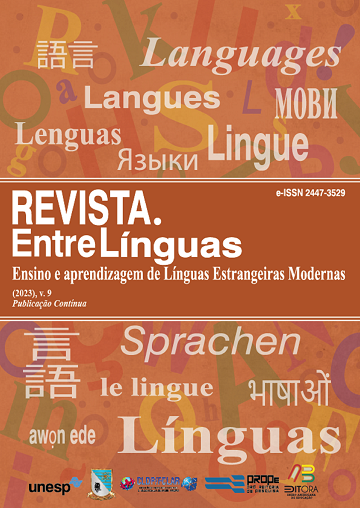Why do I have difficulty in developing abilities in the English Language?
A study with pre-service teachers in Brazil
DOI:
https://doi.org/10.29051/el.v9i00.17219Keywords:
Difficulties, Development, Abilities, English languageAbstract
This paper discusses the issue of the difficulty of a group of pre-service teachers in developing abilities in the English language. It has specific objectives to map the difficulties related to the development of abilities in the English language, to figure out the possible reasons for these difficulties, and to understand how the participants of this research develop their abilities in the English language. Therefore, we took as a paradigm the participants’ beliefs and attitudes and as base the studies of Barcelos and Vieira-Abrahão (2006), Borg (2001, 2002), Despagne (2010), Walker et al. (2004) and Gardener (1985). It is a qualitative study with a group of pre-service teachers and students of the course titled English as a modern language and signs languages from Recôncavo of Bahia Federal University. The data were generated from a free narrative interview with seventeen participants. The relevance of this study lies in the possibility of shedding light on the difficulties mapped and presenting alternatives to the respective changes.
Downloads
References
BARCELOS, A. M. F.; VIEIRA-ABRAHÃO, M. H. (org.). Crenças e ensino de línguas: foco no professor, no aluno e na formação de professores. Campinas, SP: Pontes Editores, 2006.
BORG, M. Learning to Teach: CELTA trainees' beliefs, experiences and reflections. 2002. 469 p. Thesis (Doctorate in Philosophy) – The University of Leeds School of Education, Inglaterra, 2002.
BORG, M. Teacher’s beliefs. ELT Journal, v. 55, n. 2, p. 186-188, 2001. DOI: 10.1093/elt/55.2.186. Disponível em: https://academic.oup.com/eltj/article/55/2/186/3114052. Acesso em: 15 jun. 2021.
BORG, S. Teacher cognition in language teaching: a review of research on what language teachers think, know, believe and do. Language teach, England, v. 36, p. 81-109, 2003. DOI: 10.1017/S0261444803001903. Disponível em: https://www.cambridge.org/core/journals/language-teaching/article/teacher-cognition-in-language-teaching-a-review-of-research-on-what-language-teachers-think-know-believe-and-do/F6B40C79983C27649FC1157D4023A776. Acesso em: 11 jun. 2021.
BORUCHOVITCH, E. et al. (org.). Dificuldades de aprendizagem no contexto psicopedagógico. Petrópolis, RJ: Vozes. 2001.
DESPAGNE, C. The Difficulties of Learning English: Perceptions and Attitudes in Mexico. Comparative and International Education, Canada, v. 39, n. 2, p. 55-74, 2010. DOI: 10.5206/cie-eci.v39i2.9154. Disponível em: https://ojs.lib.uwo.ca/index.php/cie-eci/article/view/9154. Acesso em: 11 jun. 2021.
GARDNER, R. C. Social Psychology and second language learning: the role of attitudes and motivation. London: Edward Arnold, 1985.
KRASHEN, S. Principals and practice in second language acquisition. California: University of Southern California, Pergamon Press, 2009.
KUBOTA, R. A Critical Examination of Common Beliefs about Language Teaching: From Research Insights to Professional Engagement. In: FANG, F.; WIDODO, H. P. Critical (Ed.). Perspectives on Global Englishes in Asia: Language Policy, Curriculum, Pedagogy and Assessment. Bristol, UK: Multilingual Matters, 2019. p. 348-365.
KUMARAVADIVELU, B. Language Teacher Education for a Global Society. A modular Model for Knowing, Analyzing, Recognizing, Doing and Seeing. New York: Routledge, 2012.
LEFFA, V. J. Por um ensino de idiomas mais includente no contexto social atual. In: LIMA, D. C. (org.). Ensino e aprendizagem de língua inglesa: Conversas com especialistas. São Paulo: Parábola Editorial, 2009. p. 179-190.
MOTA, K. S. Mulheres Brasileiras imigrantes nos Estados Unidos: (des)caminhos do bilinguismo em trajetória de identidades. In: CAVALCANTI, M. C.; BORTONI-RICARDO, S. M (org.). Transculturalidade, linguagem e educação. São Paulo: Mercado de Letras, 2007.
OXFORD, R. L. Language learning styles and strategies: Concepts and relationships. IRAL, v. 41, p. 271-278, 2003. DOI: 10.1515/iral.2003.012. Disponível em: https://www.degruyter.com/document/doi/10.1515/iral.2003.012/html. Acesso em: 11 jun. 2021.
PALLU, P. H. R. Língua inglesa e a dificuldade de aprendizagem da pessoa adulta. Curitiba: Positivo, 2008.
REIS, S. Perspectivas cognitivas na pesquisa sobre aprender a ensinar (leitura em inglês como língua estrangeira). In: SILVA, K. et al. (org.). A formação de professores de línguas: novos olhares. Campinas, SP: Pontes, 2012. v. 2, p. 107-161.
SCHMITZ, J. R. Ensino/aprendizagem das quatro habilidades linguísticas na escola pública: Uma meta alcançável? In: LIMA, D. (org.). Ensino e aprendizagem de língua inglesa: Conversas com especialistas. São Paulo: Parábola Editorial, 2009. p. 13-20.
WALKER, A. W.; SHAFERD, J.; LIAMS, M. “Not In My Classroom” Teacher Attitudes Towards English Language Learners in the Mainstream Classroom. In: NABE Journal of Research and Practice, v. 2, n. 1, p. 130-131, 2004. Disponível em: https://www.researchgate.net/publication/237626934_Not_In_My_Classroom_Teacher_Attitudes_Towards_English_Language_Learners_in_the_Mainstream_Classroom. Acesso em: 11 jun. 2021.
Published
How to Cite
Issue
Section
License

This work is licensed under a Creative Commons Attribution-NonCommercial-ShareAlike 4.0 International License.
Os manuscritos aceitos e publicados são de propriedade da Revista EntreLínguas. Os artigos publicados e as referências citadas na Revista EntreLínguas são de inteira responsabilidade de seus autores.
Transferência de direitos autorais – autorização para publicação
Caso o artigo submetido seja aprovado para publicação, já fica acordado que o(s) autor(es) autoriza(m) a UNESP a reproduzi-lo e publicá-lo na EntreLínguas, entendendo-se os termos “reprodução” e “publicação” conforme definição respectivamente dos incisos VI e I do artigo 5° da Lei 9610/98. O artigo poderá ser acessado pela rede mundial de computadores (Internet), sendo permitidas, a título gratuito, a consulta e a reprodução de exemplar do artigo para uso próprio de quem a consulta, desde que haja a citação ao texto consultado. Essa autorização de publicação 328 EntreLínguas, Araraquara, v. 1, n .2, p. 323-328, jul./dez. 2015 não tem limitação de tempo, ficando a UNESP responsável pela manutenção da identificação do(s) autor(es) do artigo. Os artigos publicados e as referências citadas na Revista EntreLínguas são de inteira responsabilidade de seus autores.











